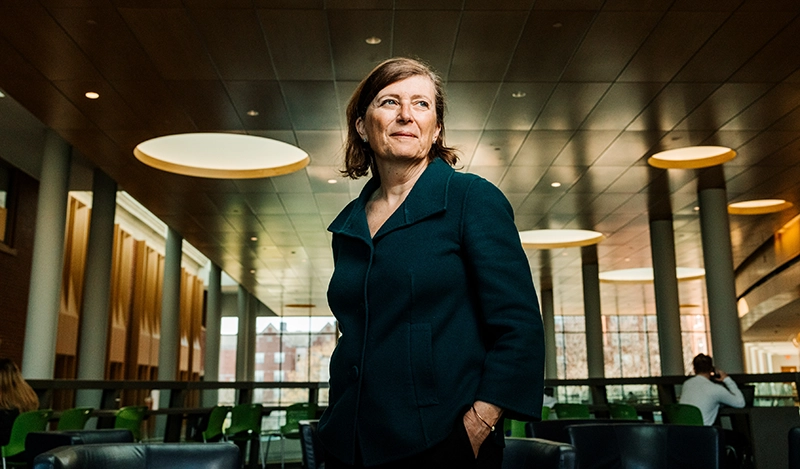
Business for good
By Michael Hagan ’15, ’19G and Vicki-Ann Downing ’21G
Professors in the Providence College School of Business are excellent teachers who prepare students for careers in accounting, finance, management, and marketing. Complementing their work in the classroom, faculty members are researchers, too.
Under the leadership of Sylvia Maxfield, Ph.D., dean of the business school since 2012 and interim provost and senior vice president for academic affairs since September 2024, the business curriculum has ethics at its core. Professors undertake research aimed at making the world a better place — studying such topics as diversity and belonging in the workplace, the marketing of sustainable products, and the impact of online sports betting.
Professors bring the knowledge gained from their inquiry back to the classroom to share with students, making for a values-based education that equips graduates to lead with integrity and pursue solutions to critical problems.
Arati Kale, Ph.D.
The emotions of investing

Those who believe that investment is just a matter of dollars and cents, that the financial world isn’t influenced by human factors, are misled, says Arati Kale, Ph.D., who was a financial analyst and manager before she joined the faculty as assistant professor of finance in 2021.
“Investors are emotional people who attempt to make rational decisions,” Kale said.
Kale’s research into the role emotion and affinity play in financial decision-making builds upon the Nobel Prize-winning scholarship of economist Robert Shiller. Her research quantifies such factors as attractiveness, gender, race, and the perceived “foreignness of names” to reveal their impact on financial decision-making. For a study published in the Journal of Behavioral and Experimental Finance, she used facial analysis software to show that fund managers whose faces align to a “scientifically attractive” ratio of width and height enjoy higher flows of investment, even if their returns do not perform as well as industry peers.
“People place money where their hearts are, not where their brains lead,” Kale said.
In the classroom, Kale teaches students about the emotional forces at play in markets. Because PC students study rhetoric, aesthetics, and logic, they are equipped to understand the human stories behind numbers. She hopes that awareness will help them practice finance more equitably and profitably — to be concerned not only with making money, but “with doing what is right.”
Patrick Kelly, Ph.D.
Risks of gambling
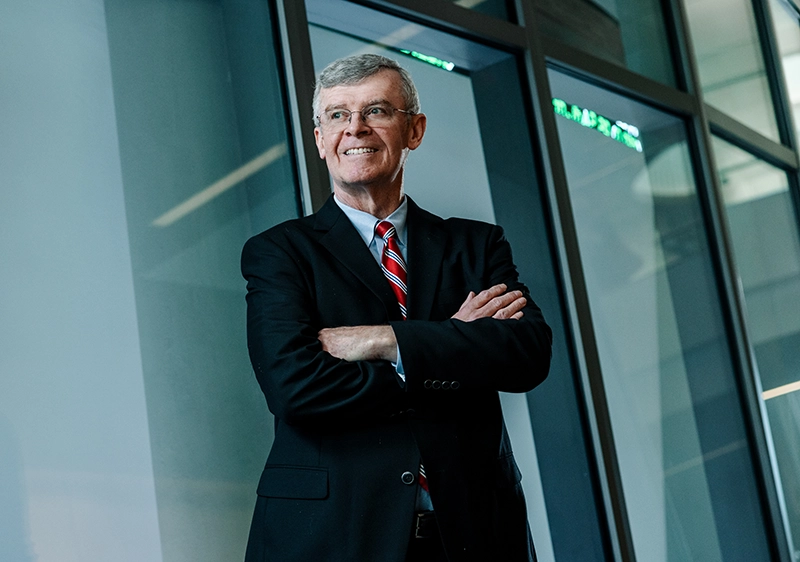
The expansion of online casinos and sports betting is pitched as a win for business and government. But Patrick Kelly, Ph.D., Ruane Endowed Professor of Accountancy, says that without education, regulation, and oversight, many individuals will be losers.
Kelly studied cases in which workers in casino regions became addicted to gambling and subsequently defrauded their employers.
“These were often long-serving, well-respected employees with no prior criminal records,” Kelly said. “They stole to support their gambling activities.”
Since Kelly and his colleague Carol Hartley, CPA, published research on problem gambling in 2010, the industry has expanded through sports betting and online casino gambling. Adults in all six New England states need only a mobile app for sports betting. In Rhode Island, the legal age to place a sports bet is 18.
Kelly’s latest research is focused on the social costs of sports betting and the precipitous increase in problem gambling among men ages 20-35. He notes that sports betting companies have successfully used targeted marketing with promotions or free bets to encourage participation.
“The access and information advantage that the gambling industry has over sports bettors is significant,” Kelly said. “My greatest concern is about young people.”
Using a grant from the Connecticut Council on Problem Gambling, Kelly coordinated a program to raise awareness of problem gambling symptoms, risk factors, and resource options. More than 150 students attended.
“We try to help students understand the risks associated with sports betting and other forms of gambling now and in the future,” said Kelly, who joined the faculty in 2001 and also directs the Ethics in Business Education Program.
Abigail Corrington, Ph.D.
Dignity in the workplace
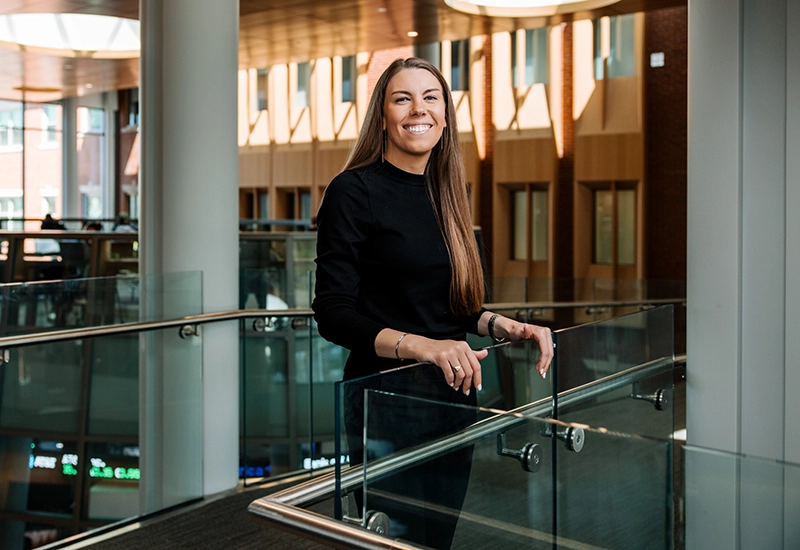
“All people deserve opportunities to thrive in life and work,” said Abigail Corrington, Ph.D., assistant professor of management, who studies diversity and inclusion in organizations with the goal of improving workplace experiences for everyone. “This is the foundation of my research.”
Using methodology ranging from experimental research (laboratory, field, online) to archival research, Corrington examines how an organization’s practices raise or lower barriers to entry, achievement, and authenticity. As a scholar of management and psychology, she studies behavior to analyze subtle discrimination that often has a greater impact than overt discrimination. And while the reactions she measures are behavioral, their consequences — including gender and racial disparities in hiring, pay, and promotion — can do tangible economic, psychological, and even physical harm, she said.
Corrington’s research demonstrates that bias persists even when organizations attempt to mitigate it through policy. Her studies differentiate between genuine corporate inclusivity and superficial gestures that sometimes do more harm than good to employees and to a company’s bottom line. Inclusivity as “window dressing,” not backed up in practice, can create problems related to employee retention, satisfaction, and wellbeing, among other issues. Having employees with diverse perspectives leads to better product design and messaging.
Corrington joined the PC faculty in 2020. She previously taught a graduate course in diversity, equity, and inclusion in business at Rice University and was a consultant for several Fortune 500 companies.
“My research brings to the surface harmful and disparate experiences that students, as future leaders in business, must confront,” Corrington said.
Kevin Newman, Ph.D.
Business and belonging
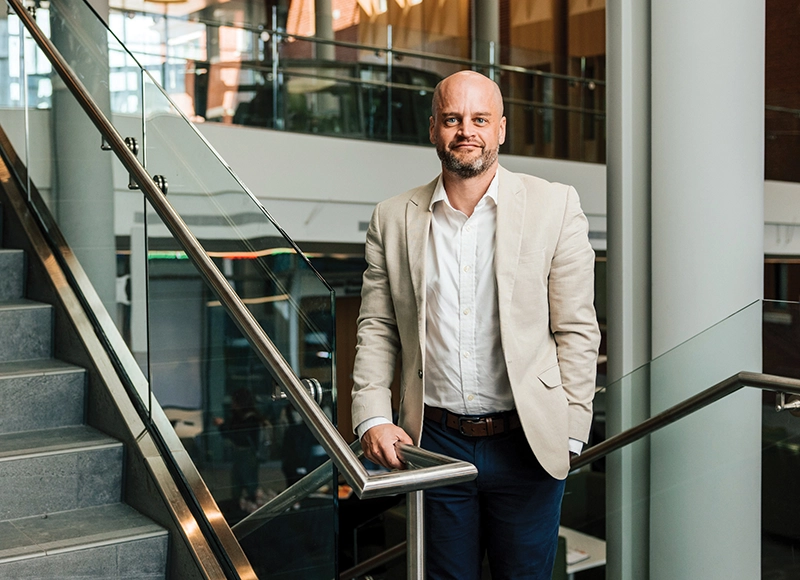
As a consumer psychologist and associate professor of marketing, Kevin Newman, Ph.D., studies how psychological needs like belonging and purpose drive business practice and consumer behavior. Many brands encourage environmentally and social conscious consumer choices, but not all customers are moved
“I study the ‘troublemakers’ — those unlikely to embrace socially and environmentally beneficial behaviors,” said Newman, who joined the faculty in 2014.
Studies show that women are more likely than men to embrace environmentally sustainable products and practices. In his research, Newman found that men respond more favorably to sustainable brands when they feel powerful or have a sense of “sustainability self-efficacy,” meaning they believe their sustainable actions can have a positive societal impact.
“Our theories and research methods often come from psychology, but what makes business scholarship unique is its application: How can we use the power of business to achieve outcomes that benefit us all,” Newman said.
In another study, Newman found that a person’s response to sustainable products varied depending on the individual’s sense of belonging. Those who reported feeling accepted and valued by others had a more favorable response to sustainable products.
His research is inseparable from questions of personal and community well-being — a subject on which he offers a course, Consumer Well-Being, that invites perspectives from the campus and alumni communities.
“Data from the World Happiness Report demonstrate that people under 30 are less happy than elder generations. Business and brands can’t replace other more essential communities, but they have a role to play in facilitating the meaningful connections young people crave,” Newman said.
Nea North, Ph.D.
Aid to people in need
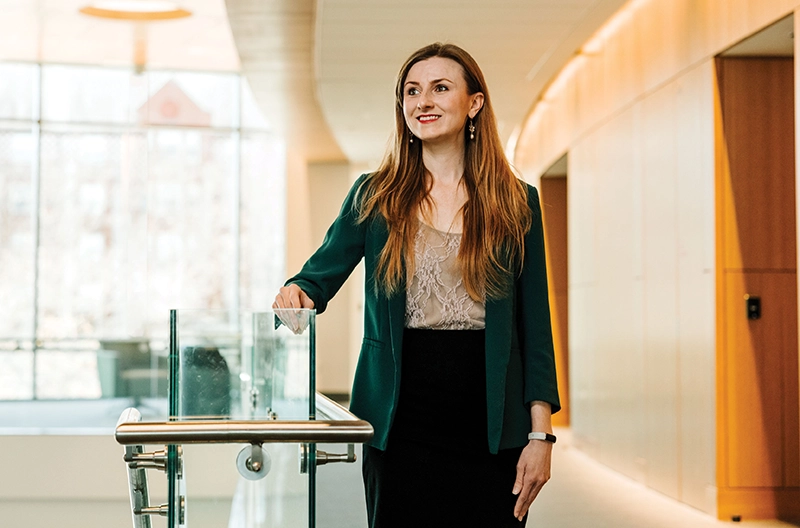
As a business strategist, Nea North, Ph.D., helped startups in Austin, Texas, develop marketing and financial strategies for long-term profitability and growth. As a scholar and assistant professor of marketing since 2021, she studies how public and charitable assistance is “brought to market” — how people in need access and experience aid — in a way that improves well-being.
For North, it’s personal. As a first-generation student from a small town, she knows the material and psychological challenges of poverty and seeking aid. It drives her inquiry: How can vital benefits be provided in an empowering way to improve not only physical but psychological well-being and increase their usage? How can marketing shift attitudes and correct misconceptions about those who receive aid in order to improve program support and charitable behaviors, thus increasing access?
North’s research shows that when eligibility requirements for public assistance are inflexible, they may exclude people with genuine need. Inflexible policies also may thwart initiative toward improving well-being and increase perceptions of injustice. North also is considering how aid thresholds can become “cliffs” that recipients may fall from. The purpose is to understand whether a system of “transitional benefits” could transform those cliffs into gentler slopes for households aspiring to enter the middle class.
“I study what shifts in class look like in both directions. We need to understand what it is like to come out of poverty, but we also need to know what it’s like to fall back,” North said.
“When people understand that those receiving assistance are people like them, their families, and their friends, they are more willing to support aid and more interested in finding solutions.”
Sylvia Maxfield, Ph.D. and Liu Wang, Ph.D.
Gender diversity and corporate risk
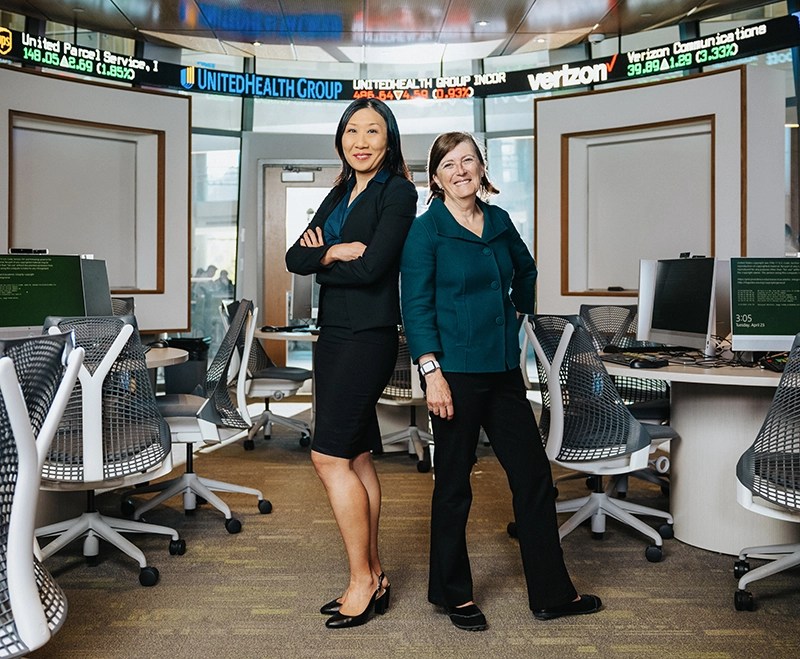
Business faculty often collaborate on research. Sylvia Maxfield, Ph.D., professor of finance, and Liu Wang, Ph.D., Ruane Endowed Professor of Finance, examined the impact of board gender diversity on corporate risk by using statistical methods drawn from the natural sciences and combining insights from the fields of psychology, economics, management, and finance.
For their study published in the journal Corporate Governance: An International Review, Maxfield and Wang synthesized and analyzed the results of 193 previous studies to gain a more comprehensive understanding of the role that gender diversity on boards plays in corporate performance. Their examination found that more diverse membership on boards mitigates corporate disclosure and misconduct risk, and that there is no evidence that board gender diversity inhibits innovation and corporate growth.
“There is a timely element to this work, as women across all business sectors continue to prove themselves and grow into senior leadership roles, while corporate leaders are examining board composition and focusing on new and continued growth strategies,” Maxfield said. “Evidence-based studies like ours can be useful in effecting change.”
Wang, who joined the faculty in 2010, added, “As boards become more responsible for risk management, our finding that board gender diversity leads to more prudent corporate risk-taking is particularly important and relevant.”





